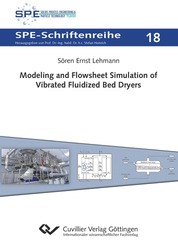| Departments | |
|---|---|
| Book Series (96) |
1381
|
| Nachhaltigkeit |
3
|
| Gesundheitswesen |
1
|
| Humanities |
2370
|
| Natural Sciences |
5408
|
| Mathematics | 229 |
| Informatics | 319 |
| Physics | 980 |
| Chemistry | 1364 |
| Geosciences | 131 |
| Human medicine | 243 |
| Stomatology | 10 |
| Veterinary medicine | 108 |
| Pharmacy | 147 |
| Biology | 835 |
| Biochemistry, molecular biology, gene technology | 121 |
| Biophysics | 25 |
| Domestic and nutritional science | 45 |
| Agricultural science | 1005 |
| Forest science | 201 |
| Horticultural science | 20 |
| Environmental research, ecology and landscape conservation | 148 |
| Engineering |
1795
|
| Common |
98
|
|
Leitlinien Unfallchirurgie
5. Auflage bestellen |
|
Advanced Search
Modeling and Flowsheet Simulation of Vibrated Fluidized Bed Dryers (Volume 18) (English shop)
Sören Ernst Lehmann (Author)Preview
Table of Contents, PDF (35 KB)
Extract, PDF (9.3 MB)
Fluidized bed dryers are the prime choice when it comes to drying of heat sensitive products, commonly processed in the pharmaceutical and food industry. As many products in these industries are fine and cohesive, mechanical vibration of the dryer is used to enable or improve fluidization. Thus, the goal of this thesis is the development of a fluidized bed drying model that accounts for the influence of mechanical vibration of the dryer, as well as its implementation in an open-source flowsheet simulation framework. Continuously operated fluidized bed dryers under steady-state conditions are the focus of this thesis. The aim during model development and implementation is the broadest possible application range of the model. A custom-built vibrated fluidized bed dryer is designed and constructed for comprehensive investigations of fluidized bed hydrodynamics and drying kinetics. Based on experimental investigations, a semi-empirical model for hydrodynamics of fine and cohesive powders is developed. The new model is combined with established models to allow for the flowsheet simulation of fluidized bed dryers for particles of all Geldart groups. Additionally, the influence of vibration is accounted for. Comprehensive validation experiments are performed for particles of different Geldart groups, different dryer geometries and a variety of process parameters, including mechanical vibration. Comparison of model predictions with experimental data attributes high accuracy of predicted particle and gas properties. Furthermore, sensitivity analyses are conducted to identify potential weaknesses in underlying model assumptions. Hereby, the validity of underlying assumptions is confirmed and potential optimization parameters for different applications are identified. The proposed model is unprecedented in terms of range of process parameters, variety of particle properties and dryer geometries, tested and found valid for.
| ISBN-13 (Hard Copy) | 9783736975392 |
| ISBN-13 (eBook) | 9783736975392 |
| Final Book Format | other |
| Language | English |
| Page Number | 182 |
| Lamination of Cover | matt |
| Edition | 1. |
| Book Series | SPE-Schriftenreihe |
| Volume | 18 |
| Publication Place | Göttingen |
| Place of Dissertation | Hamburg |
| Publication Date | 2021-12-07 |
| General Categorization | Dissertation |
| Departments |
Pharmaceutical technology
Engineering Mechanical and process engineering Environmental technology Allgemeine Verfahrenstechnik |
| Keywords | Cohesive forces, Cohesive powders, Continuous drying, Drying curve, Drying kinetics, Dyssol, Flowsheet simulation, Fluidized bed drying, Geldart groups, Hydrodynamics, Industrial scale, Mechanical vibration, Milk powder, Modeling, Open source, Pilot plant scale, Reaction engineering approach, Residence time distribution, Steady state, Vibrated fluidized bed, Dyssol, Fließschema Simulation, Geldart Gruppen, Industrieller Maßstab, Kohäsive Kräfte, Kohäsive Pulver, Kontinuierliche Trocknung, Mechanische Vibration, Milchpulver, Modellierung, Open-source, Pilotmaßstab, Reaction Engineering Approach, Steady state, Strömungsmechanik, Trocknungskinetik, Trocknungskurve, Verweilzeitverteilung, Vibrierte Wirbelschicht, Wirbelschichttrocknung |
| URL to External Homepage | https://www.tuhh.de/spe/home.html |








